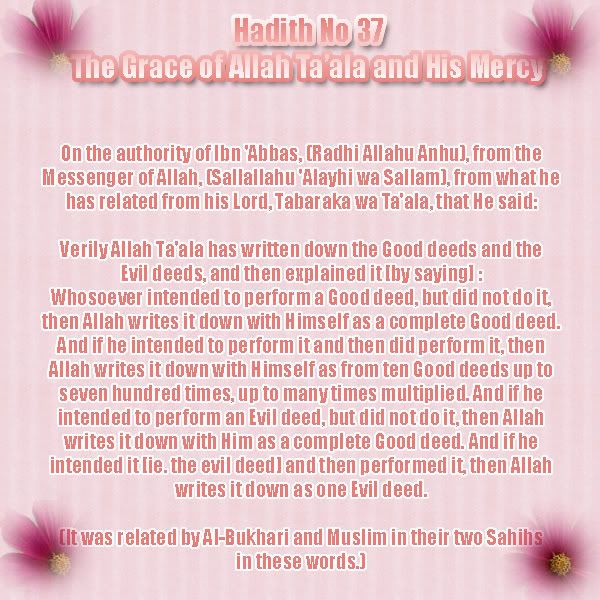 http://www.islaam.net/main/display.php?id=207&category=24
http://www.islaam.net/main/display.php?id=207&category=24 Explanation of Hadeeth Number 39
And it has been related in the tafseer of the statement of Allaah, 'azza wa jall, "And whether you disclose what is in your own selves or conceal it, Allaah will call you to account for it" [Soorah al-Baqarah, 284] that when this aayah was revealed it became a great burden upon the Sahaabah, radiAllaahu anhum. So Abu Bakr, 'Umar 'Abd-ur-Rahmaan bin 'Awf and Mu'aadh bin Jabal, amongst a number of others, came to the Messenger of Allaah (sallAllaahu alayhi wa sallam) and said "We have been burdened with actions which we find we are incapable of sustaining. Verily one of us may mention to himself [evil] things which he would not like to settle in his heart, even if he were to be offered the wealth of the dunyaa for doing so." So the Prophet (sallAllaahu alayhi wa sallam) said "I fear that you are saying what the Banoo Israa'eel said: 'We hear and we disobey'. But, rather, you should say: 'We hear and we obey'". So this became very hard upon them, and they remained in this state for some time. Then Allaah ta'aalaa revealed upon them His mercy and that which gave them respite, with His statement: "Allaah burdens not a person beyond his scope. He gets reward for that (good) which he has earned, and he is punished for that (evil) which he has earned. 'Our Lord! Punish us not if we forget or fall into error'" [Soorah al-Baqarah, 286].
So Allaah 'azza wa jall said, in a hadeeth Qudsee, "I have decreed so", and thus Allaah revealed to the Muslims that which lightened their burden, and which abrogated the aayah which came before it.
Al-Bayhaqee said that Imaam ash-Shaafi'ee, rahimahu Allaah, said: Allaah subhaanahu said "Except him who is forced [to kufr] and whose heart is at rest with faith" [Soorah an-Nahl, 106], and so there are rulings regarding kufr. And since Allaah has dropped the ruling of kufr from the one who is forced to utter such words, then similarly must be the case of the one who is mistaken or the one who forgets, since when the greater of two issues is dropped, then that which is less than it is also dropped along with it. Further, it is related from Ibn 'Abbaas (radiAllaahu anhumaa) from the Messenger of Allaah (sallAllaahu alayhi wa sallam) "Verily Allaah has pardoned for me my Ummah: their mistakes, their forgetfulness, and that which they have been forced to do under duress", and it has been related from 'Ayeshah (radiAllaahu anhaa) from the Prophet (sallAllaahu alayhi wa sallam) that he said: "There is no divorce nor freeing of a slave in a state of anger", and this is the madhhab of 'Umar and Abdullaah ibn 'Umar and 'Abdullaah ibn az-Zubair (radiAllaahu anhum). And Thaabit bin al-Ahnaf married the mother of a son of 'Abd-ur-Rahmaan bin Zayd bin al-Khattaab, so 'Abd-ur-Rahmaan intimidated and threatened him with a whip, until he unwillingly divorced her, during the Khilaafah of 'Abdullaah bin az-Zubair. So Abdullaah ibn 'Umar said to him that the divorce was not valid, as it had been made under duress, and so he should return to her. At that time Abdullaah bin az-Zubair, the Khaleefah, was in Makkah so he [ibn az-Zubair] wrote to his governor in Madeenah to return Thaabit's wife to him, and to punish 'Abd-ur-Rahmaan bin Zayd. So Safiyyah bint Abee 'Ubayd, the wife of 'Abdullaah bin 'Umar, prepared her for her return, and 'Abdullaah bin 'Umar attended their wedding feast.
And Allaah knows best.
Summary
1. That Allaah has forgiven Muslims for the sins that they commit by mistake.
2. That Allaah has forgiven Muslims for what they do out of forgetfulness.
3. That Allaah has forgiven Muslims for what they are compelled to do against their wishes.
4. That we are to overlook and forgive each other for what we do by mistake, or out of forgetfulness or under duress, since Allaah Himself does so.
*~*~*~*~*~*~*~*~*~*~*
http://fortyhadith.iiu.edu.my/hadith39.htm
Background
What has been stated in this hadith has also been stressed and emphasized in the Qur'an. In Surah al-Baqarah, Ayah 286, it is stated: "Our Lord, punish us not if we forget or fall into error."
(Another translation for the meaning of the ayah): "Oh our Lord, do not take us to task if we forget or make mistakes."
Allah says in Surah al-Ahzab, Ayah 5: And there is no sin on you concerning that in which you made a mistake, except in regard to what your hearts deliberately intended. And Allah is ever oft-forgiving, most merciful.
Allah also says in Surah al-Nahl, Ayah 106: Whosoever disbelieved in Allah after his belief, except him who is forced thereto and whose heart is at rest with faith or at certainty.
Lessons
Being excused for what is done mistakenly or out of forgetfulness does not mean that there will be no consequent rulings. This means that a person might be forgiven but he still has to take responsibility for his actions. The consequent rulings for doing something mistakenly or out of forgiveness can be classified into three categories:
1. There are mistakes where there is no consequent ruling such as a person or a Muslim who eats during the day in the month of Ramadhan out of forgetfulness. The majority of scholars say that his fasting is still valid and he does not have to repeat that day. This opinion is based on the hadith that is related by Imam Al-Bukhari and Imam Muslim which states that "any Muslim who eats during Ramadhan out of forgetfulness will be excused and forgiven."
2. There are consequent rulings to actions that are done out of mistakes or forgetfulness such as if someone kills a Muslim by mistake - as what happens nowadays in car accidents or accidents at work, etc. It is well-known by scholars that for such a person there is no consequent ruling. There is no kaffarah (expiation of sins) but he has to pay the fidyah as stated in the Qur'an. Another example is if someone caused harm or damage to the property or money of someone else by mistake. In this case the person is responsible and has to compensate for what he has damaged even though he is forgiven by Allah and is not being regarded as sinful.
3. There are actions where there are different opinions among the Muslim scholars of whether there is a consequent ruling or not. Some scholars say that the person has a consequent ruling. Others will say that he is fully excused and has nothing to do. For example, if a person talked out of forgetfulness during his prayer. Does he have to repeat his prayer? Here we have different opinions among the scholars. Some will say he has to repeat while others will say he is going to be forgiven and excused.
Another example is that a person takes an oath or swears by Allah not to do something and then he does it out of mistake or because of forgetfulness. Is this person responsible? Some scholars will say he is not forgiven and he has to make kaffarah. Others will say that he is forgiven and need not make kaffarah. A third example is if a person who is muhrim - that is he intended to perform 'umrah or hajj and then by mistake he hunts or kills an animal. Is he forgiven (i.e. is this not considered a sinful act)? He is forgiven and will not be punished for that. But the issue is whether he has to pay for it and be responsible or not. This is again a debatable issue among the scholars. Ibn Rajab states that the person who acts out of forgetfulness or by mistake is excused and that the sinfulness will be removed because sinfulness is related to those who do it deliberately. But the ruling, whatever the responsibility is, is not meant by this hadith. The hadith does not mean that they are going to be excused from everything including any kind of responsibility or rulings. This is something very important to know because some Muslims have the misconception that they are totally excused and they do not have to bear any consequences.
In the situation where a person is forced to do something which is not acceptable in Islam, this ikrah or duress can be categorized, according to Ibn Rajab, into two categories:
1. The person is powerless and has no choice to refuse doing an evil act or something which is not acceptable by shari'ah. Ibn Rajab says that he is excused.
2. The person is forced to harm someone else. In this situation, we look at the issue from the perspective that he has the power over his actions and can refuse to do the harm but at the same time his intention is to remove the harm from himself rather than to harm the other person. What is the ruling in this case? The scholars say that there are certain cases where the Muslim should not do it (i.e. harm someone else) even if he is harmed himself, such as if a Muslim is forced to kill someone else. He is not allowed to do so because this is a major harm that Muslims should do their best to avoid.
But the scholars have different views regarding similar situations and actions. The first situation is that if a Muslim took an oath not to do something and then he is forced to do it. Some say that he is excused and he is allowed to do the thing that he promised not to do - he is excused and there is no ruling here. Other scholars say he is responsible and he should not do it. If it is out of his choice, this goes under the first category. The same if someone is forced or threaten or even beaten and he has been ordered to cause damage to the property of someone else. Scholars say since he has the choice, he has to do his best not to cause the damage. The issue here is that if he does it, scholars say that he will be excused in the sense that he is not sinful but he still remains responsible for the damage that he caused.
The second situation where Muslim scholars differ is prohibited acts such as drinking wine. Some scholars say if a person is forced, then he is excused. Other scholars say though he is forced, he is not allowed to do it.
Another view or category is the distinction between speech and actions. In terms of speech, a person might be forced and allowed to say something that is not allowable. The scholars say he should not practice taqiyah. Taqiyah means to say or do something which you do not believe in and are not satisfied with. This only applies to sayings and not actions. Regarding this issue there is an agreement among the Muslim scholars. They say that whoever is forced to say something that is not allowed in shari'ah, then he will be allowed to say it - he will not be regarded or considered as 'saying' it. There is another condition that the scholars set. They say that whenever a person is put into ikrah or duress, the duress should be definite and most likely to happen and not just something the person imagines or assumes. He has to be sure.
What is mentioned in this hadith should not be abused. Some Muslims today abuse what the hadith implies by using it as an excuse to not uphold a responsibility or to break a promise. Allah knows our intentions and we should not take what is mentioned in the hadith to get away from the responsibility of fulfilling a commitment or an obligation.
Conclusion
Islam encourages ihsan, quality, excellence at work, and a sense of responsibility. At the same time, Islam discourages recklessness, carelessness, and heedlessness. However, Islam takes into account the nature of human beings and their shortcomings. It also takes into consideration the unavoidable situations that they may undergo. It should also be noticed that Islam calls for taking lessons from our mistakes and our experience with others. That's why the Prophet Muhammad, sallallahu 'alayhi wasallam, says a Muslim should not be bitten from the same hole twice.
We should also be aware (based on Hadith 32) not to harm others. That hadith says: "There should be neither harming nor reciprocating harm." According to this hadith we have to minimize the size of the harm and the consequences of the mistakes as much as possible. Even though the person might be excused and forgiven by one of these factors that are mentioned in the hadith, he still has to bear the full responsibility of his actions or deeds.
We should look at this in a positive way. Islam does not encourage people to become reckless, careless, or to feel that they are unaccountable. We should look at the hadith as a total picture of the situation and not to look at it in an isolated manner. We should have a complete view of what Islam has already established or stressed such as excellence in our performance, accountability and many other issues that we have to observe. But because we are human beings and subject to committing mistakes out of forgetfulness, Islam still leaves room for these human shortcomings and makes it possible for them to be excused and forgiven - but they have to bear some of the consequences.


